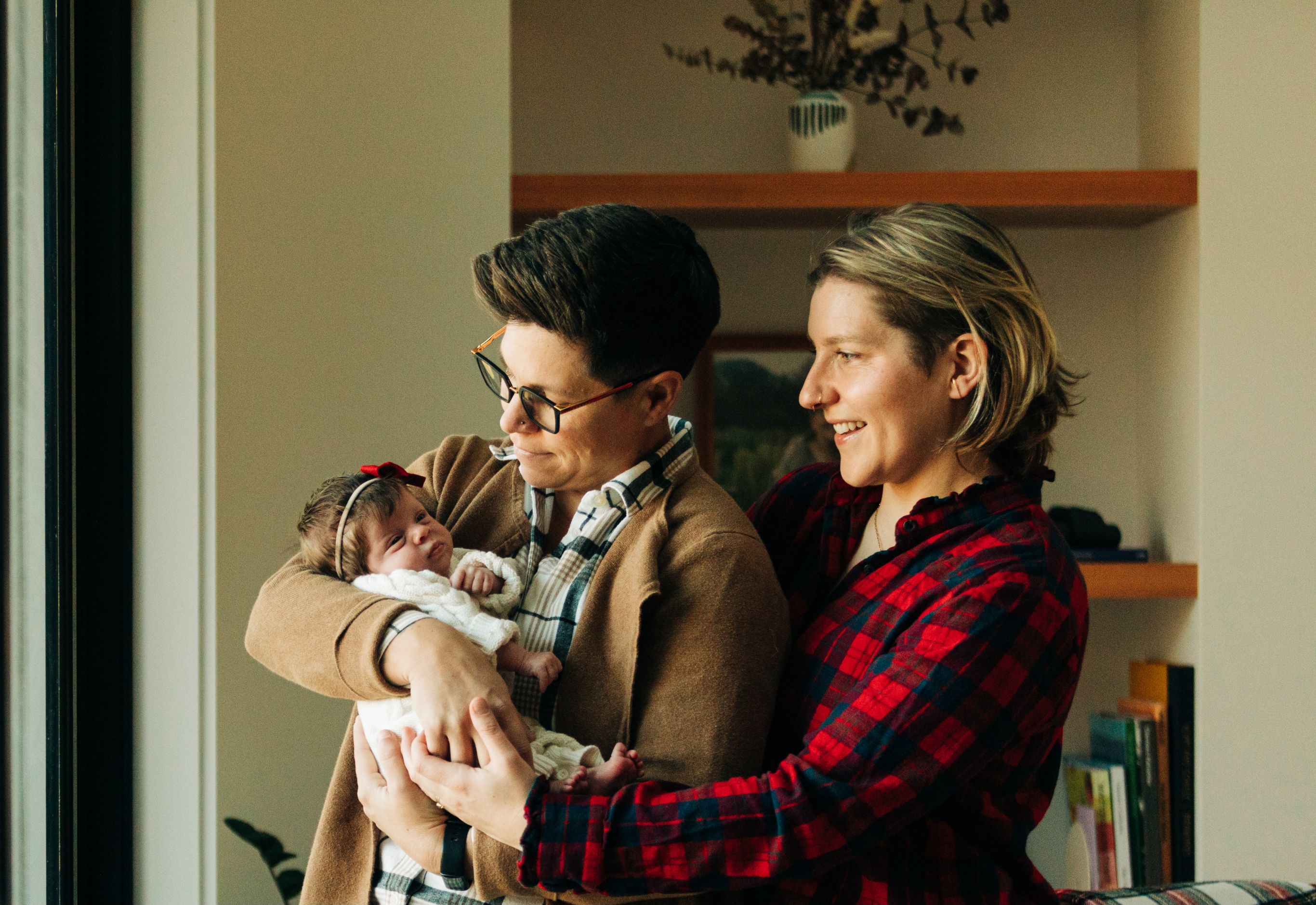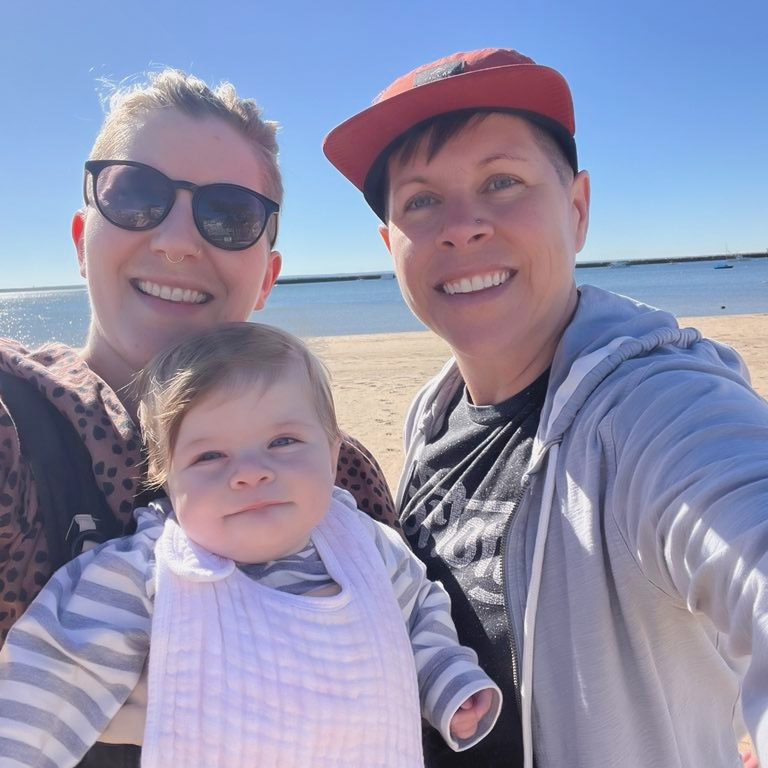August 14, 2024
August 14, 2024
As a long-time member of the U.S. military, Air Force retiree Ashley Sheffield has been a patient in hospitals and clinics far and wide. However, she had never experienced anything like the care she received at Cooley Dickinson Hospital culminating in the birth of her daughter, Wilder.
“Everybody from the nurses to the midwives and doctors were absolutely amazing—so kind and caring,” she said. “They went above and beyond every single day. I’ve been stationed all over the world, and this was by far the best treatment I’ve ever had.”
In addition to the superb medical care, Ashley and her wife, Jansyn Shaw, became part of a supportive community of expectant parents through their participation in group prenatal care.
Outstanding prenatal care, close to home
Ashley and Jansyn’s parenting journey began three years earlier. That’s when Ashley began in vitro fertilization (IVF) treatment at the Massachusetts General Hospital Fertility Center. A key factor in their decision was convenience.
Mass General and Cooley Dickinson are both part of the Mass General Brigham healthcare network. That meant Ashley and Jansyn could travel to Mass General in Boston to see fertility doctor Irene Dimitriadis, MD, for egg retrievals and embryo transfers. Meanwhile, for standard prenatal care, including checkups, lab work, and ultrasounds, they could go to Cooley Dickinson, located just four miles from their home in Haydenville, Massachusetts.
“Dr. Dimitriadis was amazing,” Ashley said. “I’d had a few pregnancies end in miscarriage and, at one point, was wondering whether to give up. She said to keep trying. So, we did another IVF cycle, and that’s when I got pregnant with Wilder.”
Ashley had previously had an excellent experience with Cooley Dickinson obstetrician gynecologist (OB/GYN) Tucker Kueny, MD, so she was pleased to start her prenatal care at the hospital around the 12-week mark. But first, she and Jansyn had to decide who would oversee her care: an OB/GYN or a team of midwives.
Normalizing pregnancy and childbirth

The certified nurse midwives (CNMs) at Cooley Dickinson ObGyn & Midwifery provide expert care and support throughout a patient’s reproductive lifespan. During pregnancy and childbirth, they partner with pregnant people and families to promote optimal health, with a focus on personalized care, education, and informed choice.
CNMs are qualified to manage normal pregnancies and births. They often care for high-risk patients in collaboration with OB/GYNs. And should a complication arise during a birth, at least one doctor is always available on the labor and delivery floor to assist.
“Pregnant people who want to embrace and normalize their pregnancy and birth experience often do well with midwives,” said Rachel Marino, CNM, director of midwifery services at Cooley Dickinson ObGyn & Midwifery. “Many people tend to focus on the negative or dangerous aspects of pregnancy. The role of midwives is to remind people that pregnancy is in fact not an illness but a normal part of life.”
Ashley and Jansyn met with Rachel to discuss their options. Ashley had been nervous about switching to a new clinic after being a patient at the Mass General Fertility Center for so long.
“I knew I was going to have a lot of questions and be extremely anxious,” Ashley recalled. “I jokingly said to Rachel, ‘Maybe I’m not the patient for you.’ And she said, ‘No, you’re exactly where you need to be.’ That gave me a sense of relief. We chose to go with the midwives.”
Finding their people in group prenatal care
After their first couple of prenatal visits with midwives, Ashley and Jansyn faced another decision: They could continue to have one-on-one visits with midwives or opt in to group prenatal care.
Group prenatal care at Cooley Dickinson brings together expectant parents and co-parents during the second half of pregnancy. The eight to 12 pregnant people in each cohort are due within six weeks of one another.
The two-hour sessions, which are run by a midwife and take place every other week, feature checkups, bonding, patient-led discussions, and education. Topics include nutrition, exercise, chest feeding, pain management during labor, baby care, and infant soothing.
“Group prenatal care is great for two groups of people specifically,” Rachel said. “One is people who have a higher-than-usual level of anxiety. The other is people who are new to town, want to make some connections, and need some extra social support.”
Ashley definitely fell into the first of those categories. “I was really stressed, and Rachel encouraged us to join group prenatal care,” she said. “It was so beneficial to be around people with similar due dates and experiences, to be able to talk about your fears and concerns, and to be reassured that you’re not the only one going through these things.”
Ashley and Jansyn continue to stay in touch with many of the families in their cohort.
“For me, that’s one of the most rewarding parts of group prenatal care—watching people form relationships that carry into the postpartum and early parenting periods and beyond,” Rachel said.
Complications lead to an early arrival
Pregnancy had its struggles for Ashley, whose age (40) left her vulnerable to complications. She ended up developing gestational diabetes and, later on, hypertension (high blood pressure).
With the emergence of hypertension, and the baby looking healthy, her care team moved to induce Ashley three weeks early. Wilder was born via caesarean section.
“I could hear the doctors talking about how much hair she had,” Ashley said. “When they showed her to me, I felt this sense of relief that she was finally here, breathing and healthy.”
“I was like, ‘Oh my god, I’m a parent. This is forever,'” Jansyn added. “It was overwhelming.”
Ashley and Jansyn praised the expertise and compassion of their labor and delivery team, which included Catherine Boshe, CNM, Antoine Naim, MD, FACOG, and Brittany Rice, RN.
“After a long labor and delivery, I felt very vulnerable, especially in the physical sense,” Ashley said. “Brittany cared for me with such a tremendous amount of patience, warmth, and dignity.”
Intentional about inclusivity

A few other aspects of their experience at Cooley Dickinson stood out for Ashley and Jansyn. One, they sensed their entire team—nurses, midwives, doctors—were consistently in touch with each other and on the same page about Ashley’s care. Two, they never felt uncomfortable or out of the ordinary for being a same-sex couple.
“We put a lot of thought and time into sensitivity and inclusion training around LGBTQ+ patients,” Rachel said. “Grace Nowakoski, our health education coordinator, runs trainings on this and has worked with me to develop language and a curriculum that are inclusive of LGBTQ+ patients. We’re very intentional about ensuring all patients and families feel welcome in our group.”
Their efforts didn’t go unnoticed by Ashley and Jansyn.
“I always felt that I could reach out to a provider without any sense of judgment, that my concerns would be heard, and that I’d be given options that best suited my needs,” Ashley said. “I’m such a fan of Cooley Dickinson, and I can’t stop raving about the medical care I received there.”


